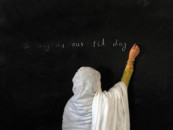Public hygiene: Pakistan among countries with most diarrhoea casualties
Precautions suggested at workshop.

“More than 2.5 billion people suffer from diarrhoea annually. While 0.7 million children die of diarrhoea, such cases are rare in developed countries,” said Dr Zulfiqar Bhutta, a researcher from Aga Khan University on Monday.
Speaking at a workshop on diarrhoea management, he said if a death occurred due to diarrhoea in a developed country, it would lead to an investigation.
The event was arranged by the Health Department and Pakistan Medical Association in collaboration with the Micronutrient Initiative (MI).
More than 60 senior health staff, university teachers, representatives of UN agencies, NGO representatives working in health and micronutrient sectors and paediatricians participated in the workshop.
Bhutta said Pakistan was among the top five countries where death by diarrhoea was common.
He said the country had not put in “sufficient” effort in diarrhoea management through sanitation, provision of safe drinking water, health and hygiene improvement.
He said that while ORS prevented dehydration, Pakistan had only 30-40 per cent ORS use rate in diarrhoea.
Bhutta said more than 40 studies across the globe had indicated that tablet zinc taken with ORS reduced severity and duration of diarrhoea by 40 per cent.
He said Pakistan had a policy of prescribing zinc and ORS, but its implementation was as low as 4-5 per cent.
He said zinc was an essential drug and urged districts managements to include it in their procurement lists. He said medical practitioners and pharmacists should include it in curricula.
Khalid Nawaz, another speaker, said given the status of zinc deficiency in the country the Micronutrient Initiative was willing to support the government to address the issue.
He said use of zinc and ORS should be actively promoted for management of diarrhoea in coordination with medical associations and the government.
UHS launches physio therapy programme
“The University of Health Sciences is committed to strengthening allied health sciences education, research and collaboration,” Vice Chancellor Major General (r) Muhammad Aslam on Monday.
He was addressing a new class of a two-year programme in physio therapy.
He said the university was training healthcare professionals including therapists, technologists, administrators, and assistants.
He said the country’s healthcare system was not fully equipped to handle the increasing population.
He appreciated the role of physio therapists.
He said, “Physical therapists are important because they know how to look at the bigger picture and take care of the smallest details. Sometimes these details mean nothing patients, but make a huge difference,” he said.
Course Coordinator Muhammad Asim said, “Trained physio therapists are competent clinicians. This programme focuses on updating and broadening their knowledge and skills to the level required to practice as a doctor of physical therapy in today’s complex and demanding healthcare environment.”
He said the curriculum had been designed in line with international standards with a focus on the evidence-based format. He said teaching through web portals would encourage active learning among students.
Published in The Express Tribune, December 31st, 2013.



















COMMENTS
Comments are moderated and generally will be posted if they are on-topic and not abusive.
For more information, please see our Comments FAQ